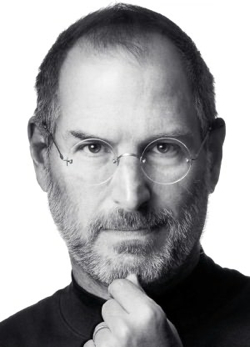 In 2003, Apple co-founder Steve Jobs was diagnosed with cancer. Luckily, it was a type of pancreatic cancer with a very high survival rate. Unfortunately, Jobs resisted his doctors' recommendations for mainstream medical treatment for nine months. Instead, he turned to experts in "alternative medicine," including an acupuncturist and a psychic.
In 2003, Apple co-founder Steve Jobs was diagnosed with cancer. Luckily, it was a type of pancreatic cancer with a very high survival rate. Unfortunately, Jobs resisted his doctors' recommendations for mainstream medical treatment for nine months. Instead, he turned to experts in "alternative medicine," including an acupuncturist and a psychic.
Jobs finally consented to surgery in July 2004, but by then the cancer had spread to tissues surrounding the pancreas, and Jobs suffered many years of declining health until he succumbed to the cancer in 2011. Biographer Walter Isaacson reported that in his last years, Jobs regretted his decision to delay mainstream medical treatment.
Though Jobs had enough business-related reasoning skill to build what is now the largest company in the world, he didn't have the kind of fully general reasoning skill needed to see that there is vastly more evidence for the effectiveness of mainstream cancer treatments than there is for the effectiveness of alternative medicine's cancer treatments. (As Tim Minchin said, "Alternative medicine... has either not been proved to work, or been proved not to work. You know what they call alternative medicine that's been proved to work? Medicine.")
Jobs' reasoning mistakes concerning medicine may have cost him his life.
Which is not to say Steve Jobs had particularly bad general thinking skills. Humans make these kinds of thinking errors all the time. Even smart people fall prey to what psychologists call "cognitive biases." Or they simply lack an understanding of a key piece of general reasoning, such as probability theory. Human reasoning is far from perfect.
Psychologists have a name for the concept of perfect reasoning. They call it "rationality."
Alas, our brains aren't built for perfect reasoning. But we can learn new concepts and mental habits that will bring us a little bit closer to perfect reasoning. We can become good enough reasoners to avoid Steve Jobs' mistake. We can become good enough to make better investments, better career choices, better relationship choices, and more.
Psychologists have spent 40 years not only cataloguing the kinds of thinking errors we make, but also the mental habits that, if trained, can help us avoid errors and make better decisions. As the authors of a 2009 paper in Perspectives on Psychological Science wrote, "The optimal moment to address the question of how to improve human decision making has arrived."
Further reading:
Elkind (2008). The trouble with Steve Jobs. Fortune, March 5.
Isaacson (2011). Steve Jobs. Simon & Schuster.
Milkman et al. (2009). How can decision making be improved? Perspectives on Psychological Science 4, 4: 379-383.
Sampson (2002). Why the National Center for Complementary and Alternative Medicine (NCCAM) Should Be Defunded. Quackwatch.
Stanovich (2010). Rationality and the Reflective Mind. Oxford University Press.


